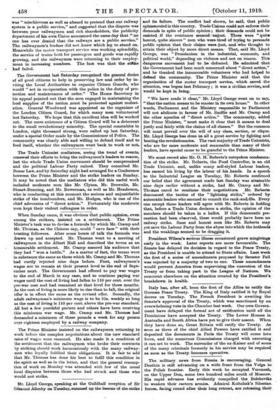When Sunday came, it was obvious that public opinion, even
among the strikers, insisted on a settlement. The Prime Minister's task was to devise a formula by which Mr. Cramp and Hr. Thomas, as the Chinese say, could " save face " with their trusting followers. After some hours of talk the formula was drawn up and accepted. Mr. Thomas went to a meeting of railwaymen in the Albert Hall and described the terms as an honourable settlement. Mr. Cramp assured his audience that they had " won a battle." As a matter of fact, the terms were in substance the same as those which Mr. Cramp and Mr. Thomas had curtly rejected nine days before. First, railwaymen's wages are to remain at their present level to the end of Sept- ember next. The Government had offered to pay war wages to the end of March in any case, and .to continue paying war wages until the cost of living had fallen to 110 per cent. over the pre-war cost and had remained at that level for three months. As the cost of living is more likely to rise than to fall, the original offer is in effect the same as the revised offer. Secondly, the adult railwayman's minimum wage is to be 51s. weekly so long as the cost of living is 110 per cent. above the pre-war standard. All but a few youthful porters and others have been receiving this minimum war wage. Mr. Cramp and Mr. Thomas had demanded a minimum of three pounds a week for any person over eighteen employed by a railway company.


































 Previous page
Previous page